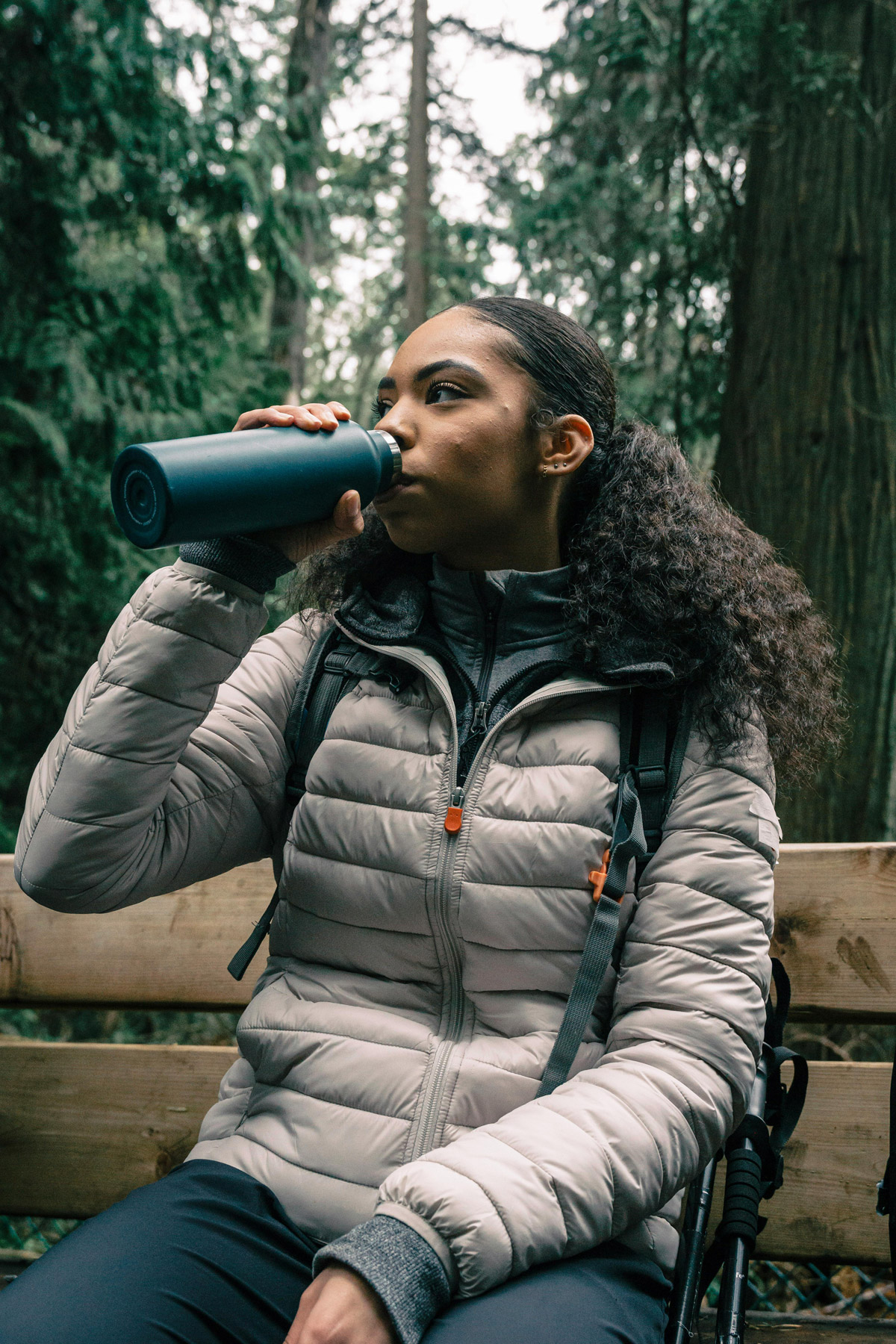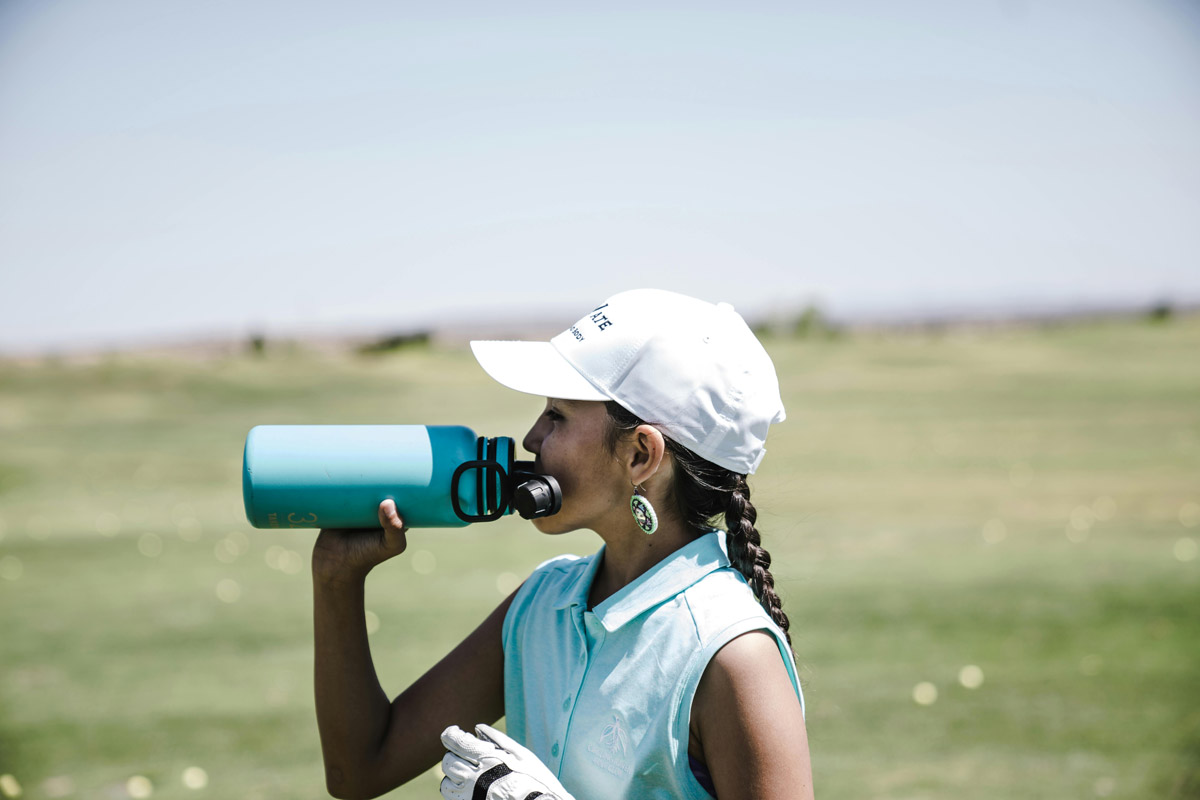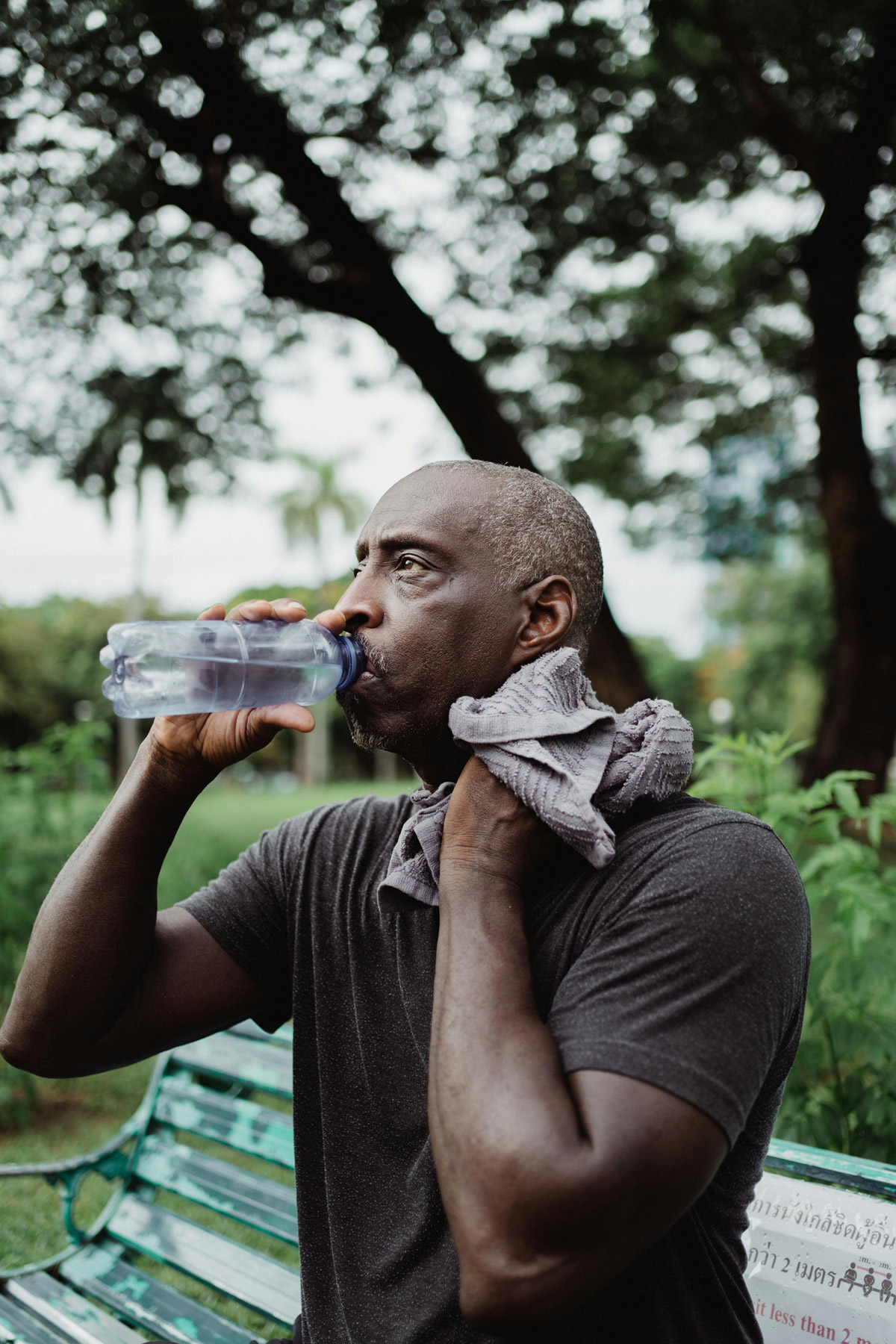
I picked up a new Bubba water bottle to use at my office because it’s pretty in an effort to increase my water intake. I had been in the habit of stealing a company soda (from the refrigerator bin marked “for clients only”) for an afternoon pick-me-up, but I’m pleased to say I haven’t done that once in 2024 since bringing in the Bubba! Although I feel like I’m getting up to go to the bathroom all the time, I have noticed the difference in how water actually satisfies thirst in a way other beverages simply do not. Plus I knew I had to increase my water consumption to justify my potato chip consumption. Remember when Brooke Shields had a seizure from being overhydrated and her doctor prescribed potato chips? Yeah, so I’m working at it from the other end. But drinking too much water is a serious thing, and here are some symptoms to look out for:
So how much water should you drink every day? Despite being told that we should drink eight glasses of water daily, there’s no “magic” number. There are, however, a number of factors that influence how much water you should take in: The NAM [National Academy of Medicine] shares that hydrated women average 91 ounces of total water and men average 125 ounces total, stemming from both hydrating foods and beverages.
“What is important to know is that your body’s water needs change based on your age, your lifestyle and your sex,” explains Dr. Neha Vyas, a family medicine physician at Cleveland Clinic. “Your body’s hydration needs may also change if you have a fever or an illness.”
When it comes to drinking water, research has found that thirst is a major sign of a deficit. Other common signs of dehydration can also be signs of overhydration, which can then lead to hyponatremia, causing low sodium levels due to dilution from extreme excess of fluids. It’s good to be generally aware of how much water you’re taking in throughout the day so you can get to the bottom of any sneaky symptoms.
“In general, the symptoms of dehydration are much more severe than overhydration,” notes Dr. Byas. “That being said, overhydration can be quite serious as sometimes your body cannot get rid of the extra fluid that is either generated or consumed.”
The earliest symptoms of drinking too much water include: frequent urination, nausea, bloating, vomiting, headache.
“Since these are very general and can occur in many illnesses, it is important to take a good history to determine whether the symptoms can be due to excess water consumption,” advises Dr. Vyas.
More serious symptoms that may develop include: confusion, irritability, drowsiness, muscle cramping, vision changes, blood pressure changes, seizures, difficulty breathing, loss of consciousness, coma.
Oh thank you Parade, I love having a new cause to blame my irritability on! And hunger is so overused, trotting out “I’m overhydrated!!” will be a nice change. Conversely, not drinking enough water is also a problem. As long as people are trampling over each other to spend $45 on a water bottle, they ought to be appropriately hydrated. Dr. Sotiria Everett, a Clinical Assistant Professor at Stony Brook Medicine told Salon.com that a simple way to start assessing your hydration, aside from thirst, is to check the color of your morning wee. And what color wee do we want to see? A lemonade-ish hue means good hydration (excluding pink lemonade), whereas darker tones like cider or apple juice signal you need to drink more water. It’s all very bathroom focused, isn’t it? While I may be visiting the little girls room all the time now, it’s worth it for those chips. And my health. But yeah, I’m motivated by the chips.
Photos credit: PNW Productions, Jopwell, Ricky Esquivel and Ketut Subiyanto on Pexels














If you take vitamin C your urine will be very yellow.
SO happy to see this article! I’m a big water drinker and sometimes wonder if I’m consuming too much. Based on the average in the article, I am drinking more ounces though I don’t feel/see any negative side effects.
Just FYI I went into the hospital in September because I passed out and fractured my skull. Turns out I hyponatremia and I was drinking too much water. I had none of those symptoms except I was urinating frequently. Turns out my body runs a little low in sodium. I am now limited to 60 oz of water a day until I see the kidney specialist (Nephrologist) at the end of the month.
I actually worked with a trainer/nutritionist for several years and she was very helpful in getting my water intake up. We live at a high altitude and that is a major factor – even though there’s no “magic number,” a good rule to follow is one ounce per pound of body weight. So right now I drink about a gallon a day, plus two 12 oz. glasses – if I’m doing a lot of strenuous activity or it’s especially hot, I have more. For example this weekend I went to the gym and then helped my friend muck out stalls on her farm. I definitely drank more water than usual. Also I have a chronic condition so that factors in, and my doctor is aware of my exercise and nutrition routine including my water intake. I know not everyone has the privilege of these things, but I try to share what I’ve learned, and if you can afford to even talk with a doctor about it, it’s really worth it.
Not to be contrary, but the formula one ounce per pound of body weight has zero base in science. A 220 lb man should be drinking 220 ounces, or almost two gallons of water/day? I’m a big fan of everyone figuring out what works best for them, but that seems excessive. I weigh a lot, and aim for 3 litres of water/herbal tea/day. When I travel I usually drink less, and in a few days my body will adjust.
Again, whatever floats your boat and if your medical team supports what you’re doing then it’s working for you.
As stated, yes. My medical team supports me. 🙂 Thanks for the concern
Holy crap, if I drank that much water I’m sure my cells would explode. I am a very curvy 168 at the moment and I cannot imagine drinking 168 oz of water. That’s 2.6 of the big jug I drink now…….Wow……..
Thanks so much for sharing this! A while ago I increased my water intake and at the same time started getting frequent toe/foot cramps, it took me a bit to put the 2 together and once I cut back on my water intake (now 40 ozs instead of 80) I’ve noticed a difference. For reference. I’m 59, moderately active, have very low blood pressure (so yeah, chips are my jam too) but otherwise pretty healthy.
I always wonder whether in US offices, there are no glasses or glass carafes to drink water from. In Europe we normally drink water from glasses. The water comes either from the tap or from a fountain in the office kitchen. I personally prefer glass containers to plastic containers but that might just be me…
Are people not peeing enough or something? How can your body consume so much water that it makes you vomit? I drink water all day while at my desk, and it results in frequent bathroom trips (which in turn gets my step count up).
I can only think of water retention as being an issue to cause a lack of urination. I’m not a dr nor do I play one on tv so I really have no idea but I do retain A LOT of water as the day goes on and then guess who is up numerous times per night? I would also hazard a guess that some meds and health issues can cause it too.
I’ve been wondering the same thing since I read the article about Brooke Shields a few weeks ago. Severe health issues aside, the risk of drinking so much water that it is damaging to the body or leads to a stroke seems pretty low to me? I feel it would be a ton of work to force that much water down.
But then again, I don’t live in a place with extreme weather conditions and maybe that is a factor.
It is not the amount of watee, but the lack of minerals. Drinking too much water flushes out minerals especially sodium leading to low blood pressure, cramps and the other symptoms described. Thats why chips or anything salty helps.
It is especially risky for people exercising at high temperatures, sweating a lot and not replacing electrolytes.
From what I read after the Brooke Shields incident, the real danger can be realizing you are behind in your water goal and drinking a whole lot to catch up. If you are already a bit over hydrated from setting your daily water intake too high, drinking a lot at once can really screw your body up. They gave the example of a woman who had been out all day and drank her daily amount all at once. It messed up her brain and she died.
All the warnings about being dehydrated during races have lead to people dying of over hydration. Dying of dehydration during races basically never happened.
This is a great article! I don’t feel I’m in danger of drinking too much water anytime soon. I would like to know, however, how coffee and other liquids factor into this equation.
FH, you need to include liquids like coffee and tea. I also have a huge glass of milk (10-12 oz). What I’ve read is that women generally need 11 1/5 cups per day, but part of that is from the food we eat because there’s water in food.
I used to make a point of drinking 8 cups of water a day in addition to the rest. Now I drink 6 or 7. As long as I’m not thirsty, I think I’m good.
It’s also important to note, if you have a health condition like an ostomy (ostomate here!) your needed water intake will be very very different from an average person’s needs. Definitely consult your GI about what you specifically need for your body to continue to function.
We also get about 20% of our water intake from the food we eat. If you’re eating produce, you’re getting water with vitamins, minerals and fiber.
THIS! Our bodies are very efficient at getting water out of what we eat.
I need a fair amount of water daily, around 3 ltrs, which some people might say is too much but I’m obese and diabetic so keeping a steady intake of water is good for both my size and ailments. I will say there are times I do feel a wee bit spaced out and nauseous but no idea if that’s water or the meds I take for other problems.
Happened to me! I ended up with low blood sodium for several months. I moved to a colder climate & everything righted itself eventually–I drink less water now.
Drinking enough water always makes me feel better! Because I have low blood pressure and an irregular heartbeat, I use an electrolyte supplement daily, so I have to keep my water intake up to balance it out.
Also, other vitamins and supplements can change the color of your urine, so it’s important to research what you’re taking. Vitamin B2 (riboflavin) turns your urine neon yellow!
The article was overall so interesting but … “When it comes to drinking water, research has found that thirst is a major sign of a deficit.” For real, is there a research professor somewhere that spent years testing their theory that thirst is a sign of dehydration? That line had me howling. How can the writer put this down with a straight face.
Lots of people think that they are hungry when they are actually thirsty and some may not recognize thirst when they feel it. Also, there are many people who do not feel thirst. My hubby is one of those and it’s weird. He just stays in the habit of drinking a minimum 64 oz per day, more in the summer when he is outside all the time. Thirst is a weird beast.
Just in case someone needs this PSA, there is a medical condition where your thirst never stops, called diabetes insipidus (not to be confused with mellitus). So, if you know a baby or a child who is always thirsty, no matter if bottle- or breast-fed or older, and who has to go to the bathroom so many times in a day and night, get him or her to the doctor. This is a rare disease and not well-known, but if suspected, can be easily tested, and medication really helps. I know because my son has it.
I developed transient DI after transsphenoidal pituitary surgery in the nineties. I was warned before the operation that the condition could be permanent.
How are you doing these days? I’ve read that this isn’t uncommon after surgery, but I imagine it must have been a shock…
We’re only three years into the DI “journey” and in my son’s case, reasons are unknown. As of yet.